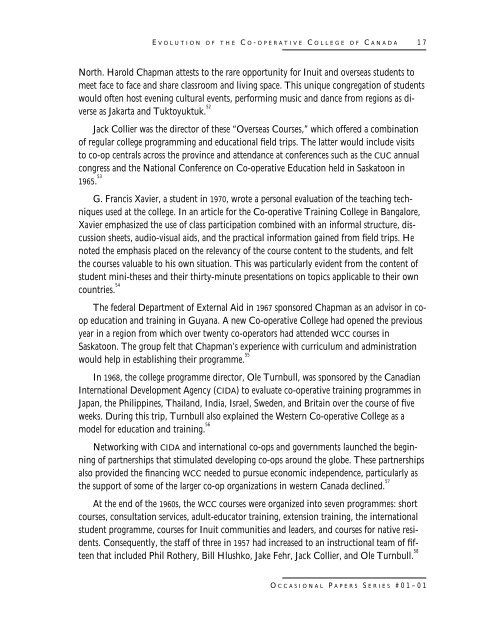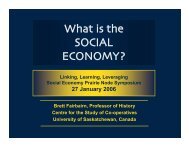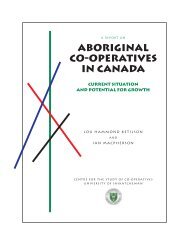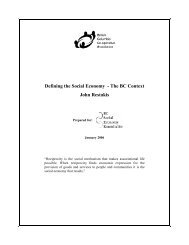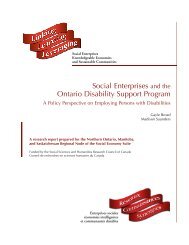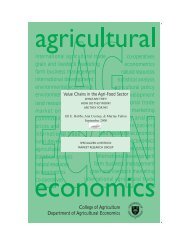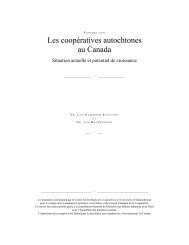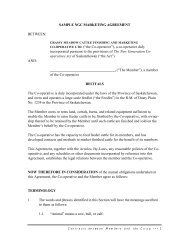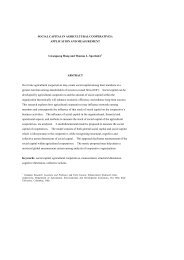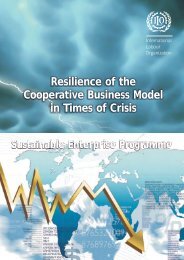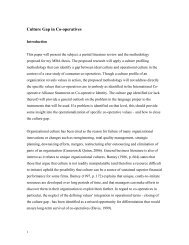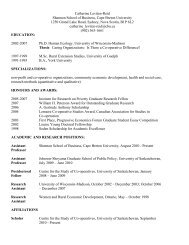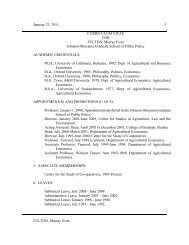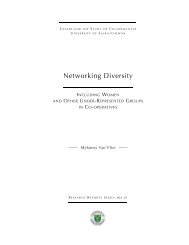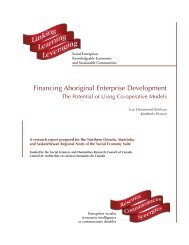Co-op College History - Centre for the Study of Co-operatives
Co-op College History - Centre for the Study of Co-operatives
Co-op College History - Centre for the Study of Co-operatives
Create successful ePaper yourself
Turn your PDF publications into a flip-book with our unique Google optimized e-Paper software.
E VOLUTION OF THE C O - OPERATIVE C OLLEGE OF C ANADA 17<br />
North. Harold Chapman attests to <strong>the</strong> rare <strong>op</strong>portunity <strong>for</strong> Inuit and overseas students to<br />
meet face to face and share classroom and living space. This unique congregation <strong>of</strong> students<br />
would <strong>of</strong>ten host evening cultural events, per<strong>for</strong>ming music and dance from regions as diverse<br />
as Jakarta and Tuktoyuktuk. 52<br />
Jack <strong>Co</strong>llier was <strong>the</strong> director <strong>of</strong> <strong>the</strong>se “Overseas <strong>Co</strong>urses,” which <strong>of</strong>fered a combination<br />
<strong>of</strong> regular college programming and educational field trips. The latter would include visits<br />
to co-<strong>op</strong> centrals across <strong>the</strong> province and attendance at conferences such as <strong>the</strong> CUC annual<br />
congress and <strong>the</strong> National <strong>Co</strong>nference on <strong>Co</strong>-<strong>op</strong>erative Education held in Saskatoon in<br />
1965. 53<br />
G. Francis Xavier, a student in 1970, wrote a personal evaluation <strong>of</strong> <strong>the</strong> teaching techniques<br />
used at <strong>the</strong> college. In an article <strong>for</strong> <strong>the</strong> <strong>Co</strong>-<strong>op</strong>erative Training <strong>Co</strong>llege in Bangalore,<br />
Xavier emphasized <strong>the</strong> use <strong>of</strong> class participation combined with an in<strong>for</strong>mal structure, discussion<br />
sheets, audio-visual aids, and <strong>the</strong> practical in<strong>for</strong>mation gained from field trips. He<br />
noted <strong>the</strong> emphasis placed on <strong>the</strong> relevancy <strong>of</strong> <strong>the</strong> course content to <strong>the</strong> students, and felt<br />
<strong>the</strong> courses valuable to his own situation. This was particularly evident from <strong>the</strong> content <strong>of</strong><br />
student mini-<strong>the</strong>ses and <strong>the</strong>ir thirty-minute presentations on t<strong>op</strong>ics applicable to <strong>the</strong>ir own<br />
countries. 54<br />
The federal Department <strong>of</strong> External Aid in 1967 sponsored Chapman as an advisor in co<strong>op</strong><br />
education and training in Guyana. A new <strong>Co</strong>-<strong>op</strong>erative <strong>Co</strong>llege had <strong>op</strong>ened <strong>the</strong> previous<br />
year in a region from which over twenty co-<strong>op</strong>erators had attended WCC courses in<br />
Saskatoon. The group felt that Chapman’s experience with curriculum and administration<br />
would help in establishing <strong>the</strong>ir programme. 55<br />
In 1968, <strong>the</strong> college programme director, Ole Turnbull, was sponsored by <strong>the</strong> Canadian<br />
International Devel<strong>op</strong>ment Agency (CIDA) to evaluate co-<strong>op</strong>erative training programmes in<br />
Japan, <strong>the</strong> Philippines, Thailand, India, Israel, Sweden, and Britain over <strong>the</strong> course <strong>of</strong> five<br />
weeks. During this trip, Turnbull also explained <strong>the</strong> Western <strong>Co</strong>-<strong>op</strong>erative <strong>Co</strong>llege as a<br />
model <strong>for</strong> education and training. 56<br />
Networking with CIDA and international co-<strong>op</strong>s and governments launched <strong>the</strong> beginning<br />
<strong>of</strong> partnerships that stimulated devel<strong>op</strong>ing co-<strong>op</strong>s around <strong>the</strong> globe. These partnerships<br />
also provided <strong>the</strong> financing WCC needed to pursue economic independence, particularly as<br />
<strong>the</strong> support <strong>of</strong> some <strong>of</strong> <strong>the</strong> larger co-<strong>op</strong> organizations in western Canada declined. 57<br />
At <strong>the</strong> end <strong>of</strong> <strong>the</strong> 1960s, <strong>the</strong> WCC courses were organized into seven programmes: short<br />
courses, consultation services, adult-educator training, extension training, <strong>the</strong> international<br />
student programme, courses <strong>for</strong> Inuit communities and leaders, and courses <strong>for</strong> native residents.<br />
<strong>Co</strong>nsequently, <strong>the</strong> staff <strong>of</strong> three in 1957 had increased to an instructional team <strong>of</strong> fifteen<br />
that included Phil Ro<strong>the</strong>ry, Bill Hlushko, Jake Fehr, Jack <strong>Co</strong>llier, and Ole Turnbull. 58<br />
O CCASIONAL P APERS S ERIES #01–01


